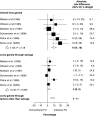Mechanisms of improved survival from intensive followup in colorectal cancer: a hypothesis
- PMID: 15685236
- PMCID: PMC2362076
- DOI: 10.1038/sj.bjc.6602369
Mechanisms of improved survival from intensive followup in colorectal cancer: a hypothesis
Abstract
A meta-analysis of six randomised trials demonstrated that intensive followup in colorectal cancer was associated with an absolute reduction in all-cause 5-year mortality of 10% (95% confidence interval (CI): 4-16)--however, only two percent (95% CI: 0-5) was attributable to cure from salvage re-operations. We postulate that other factors, such as increased psychological well-being and/or altered lifestyle, and/or improved treatment of coincidental disease may contribute to the remaining lives saved, and form important future research questions.
Figures
References
-
- Braunholtz DA, Edwards SJ, Lilford RJ (2001) Are randomized clinical trials good for us (in the short term)? Evidence for a ‘trial effect’. J Clin Epidemiol 54: 217–224 - PubMed
-
- Calle EE, Rodriguez C, Walker-Thurmond K, Thun MJ (2003) Overweight, obesity, and mortality from cancer in a prospectively studied cohort of U.S. adults. N Engl J Med 348: 1625–1638 - PubMed
-
- Deeks JJ, Altman DG (2001) Effect measures for meta-analysis of trials with binary outcomes. In Systematic Reviews in Health Care: Meta-analysis in Context Egger M, Davey-Smith G, Altman DG (eds) pp. 318–319. London: BMJ Books
-
- Goodman MT, Kolonel LN, Wilkens LR, Yoshizawa CN, Le Marchand L (1990) Smoking history and survival among lung cancer patients. Cancer Causes Control 1: 155–163 - PubMed
Publication types
MeSH terms
LinkOut - more resources
Full Text Sources
Medical


